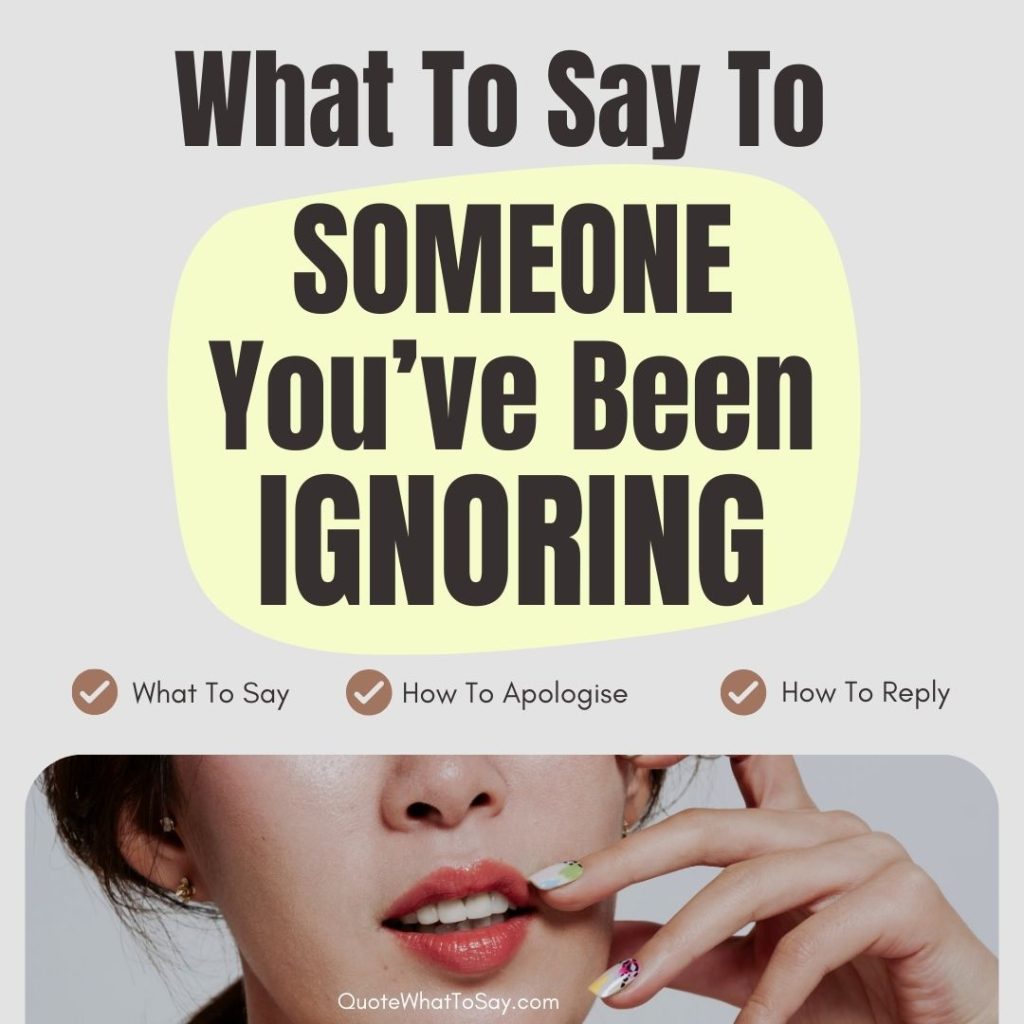When you have been out of touch or intentionally ignoring someone, reaching back out can feel intimidating.
You might worry about how they will react, wonder what to say, or feel guilty for the silence.
Reconnecting does not have to be overwhelming. The key is to be genuine, acknowledge the time apart, and, if appropriate, offer a simple explanation.
A well-thought-out message can help rebuild the connection and open the door for honest communication moving forward.

Understand Why You Ignored Them
Before reaching out, reflect on why you stopped communicating.
Were you feeling overwhelmed, avoiding a difficult conversation, dealing with personal issue?
Or is it because you have a problematic relationship with him/her (eg. over-interfering parents, friend who asked to borrow money, unhappy long-distance girlfriend / boyfriend)?
Understanding the root cause can help you communicate more openly and avoid falling into the same pattern – whether you distanced yourself intentionally, because you needed space, or staying in touch fell off your radar due to life got busy.
It also allows you to be transparent with the person if they ask about the time gap, which can rebuild trust.
What To Say to Someone You’ve Been Ignoring
Reaching out to someone you have been ignoring can feel nerve-wracking, especially if he/she is someone you love, but it is often a step toward repairing relationships and relieving tension.
Reconnecting requires sensitivity, honesty, and a little bravery.
This guide covers how to approach this conversation, what to say, how to reply, and ways to acknowledge the gap with genuine empathy.
1. Approaching the Conversation with Honesty
When reaching out, start by being honest about the situation, without over-explaining or making excuses.
Consider these options:
(a) A simple acknowledgment of the silence or casual check-in is often enough. Honesty can help set a foundation for open communication. If you are struggling with what to say, here are a few examples that show you are aware of the time gap and are open to reconnecting:
- “I realize it’s been a while since we talked, and I wanted to check in.”
- “Hey, I’m sorry for the silence. I’d love to catch up soon if you’re up for it.”
- “I know I’ve been distant lately. Just wanted to say hello and see how you’re doing.”
- “I know I’ve been MIA. Hope things are good with you! Would love to reconnect and hear from you.”
- ” Hey! I realize I went quiet for a bit. It wasn’t intentional, and I’d love to reconnect if you’re open to it.”
- “I realize I haven’t been there lately, but I’m here now and would love to hear about what’s new with you.”
- “I know it’s been a bit since we last spoke, and I apologize for that. Would you be up for reconnecting?”
- “Hey! I know it’s been a while, and I wanted to see how you’re doing. I’d love to catch up if you’re open to it!”
(b) Express that you missed the connection: Letting them know they were on your mind can soften the initial awkwardness. For examples:
- “I’ve been thinking about you and miss chatting. How have you been?”
- “I missed chatting with you and hope we can reconnect moving forward.”
- “I needed some time to regroup, but I missed our connection and would love to catch up.”
- “Hey, I know it’s been a while. I’ve missed our talks and wanted to check in. How have you been?”
(c) Explain if necessary: How to tell someone you’re not ignoring them could be challenging. If your silence was due to a specific reason or lost touch unintentionally, briefly explain. Avoid diving too deeply into excuses but try something like:
- “Hey, I just wanted to reach out. Life got away from me, and I’m sorry it’s been so long.”
- “Life has been hectic, and I needed some time to regroup. I hope we can pick up where we left off.”
- “I apologize for the sudden silence. I was dealing with some personal stuff but should have been more upfront.”
- “Life got really overwhelming for a bit, and I needed to step back. I missed talking to you, though, and would love to pick up where we left off.”
2. How to Craft a Sincere Apology
If the reason for the silence was personal or hurtful, offering a sincere apology can go a long way in mending the relationship.
A good apology acknowledges the impact on the other person and avoids shifting blame – especially if you wonder how to reply to someone asking why you have been ignoring him/her.
Remember that a genuine apology is brief, respectful, and not defensive.
Avoid phrases like, “I’m sorry if you were upset” or “I had a lot going on,” which can sound dismissive.
Instead, start with a simple apology like:
- “I’m really sorry for not staying in touch. I’d love to make it up to you.”
- “I’m sorry if my silence made you feel neglected. That wasn’t my intention.”
- “I apologize for being distant. I missed our connection and regret not reaching out sooner.”
- “My apologies for pulling back without explanation. I’d love to reconnect if you’re open to it.”
- “I regret not being more responsive. Please know it wasn’t personal, and I’m genuinely sorry.”
- “I’m really sorry for not staying in touch. I should have reached out, and I regret not doing so.”
- “I’m sorry for the distance between us. I value our friendship and regret making you feel ignored.”
- “I owe you an apology for going quiet. I should have communicated better, and I’m sorry for any hurt.”
- “I know it’s been a while, and I’m sorry for going quiet. I’d love to reconnect and hear how you’ve been.”
- “I’m really sorry for not keeping in touch. I know it may have hurt you, and I didn’t mean for that to happen.”
- “I’m sorry for the silence. I didn’t mean to distance myself, and I hope we can reconnect. How have you been?”
- “I’m sorry if my silence hurt you. I didn’t mean for that to happen, and I’d love a chance to rebuild our connection.”
3. Choose the Right Communication Medium
Depending on your relationship and the circumstances, you might choose to reach out through a text, WhatsApp, email, phone call, or even in person.
If the person is someone you know well or a close friend, a phone call or in-person conversation may feel more personal and sincere.
However, if you feel nervous or unsure how they will respond, a message or email might be a gentler way to open the conversation and give them time to process.
When deciding, consider these points when trying to reconnect with someone you’ve been ignoring:
(a) Over text or message: Good for brief, casual apologies and testing the waters to see if they are open to reconnecting.
(b) Email: Allows for a more thoughtful, longer message if you feel an explanation is due.
(c) Phone call or face-to-face: Shows that you are committed to making amends and value their friendship.
4. Focus on Rebuilding Trust and Connection
After your initial message or conversation, focus on rebuilding trust by being consistent in your communication.
Avoid falling back into the habit of being unresponsive. If you are genuinely busy, keep them in the loop, even with small updates or brief messages. Consider saying things like:
- “I’m looking forward to hearing how you’ve been!” — This shows interest in their life and invites them to share.
- “I know it’s been a bit of a gap, but I’m here now and would love to reconnect.” — Acknowledges the past but emphasizes your commitment to move forward.
Other examples of what to say:
- “If you’re open to it, I’d love to start fresh and keep our connection strong.”
- “I want to make things right and be a better friend. Let’s get together soon.”
- “I’m truly sorry for going quiet. You deserve better, and I’d like to rebuild that trust.”
- “I’d like to be more present in our friendship. What can I do to support you right now?”
- “I’m here and want to show up consistently from now on. How about a coffee next week?”
5. Preparing for Different Reactions
People respond to being ignored in various ways, so it is helpful to be prepared for different reactions.
Some people may respond positively and welcome the reconnection, while others might express hurt, anger, or even choose not to respond at all.
Here is how to handle a few common responses when reply to someone you’ve been ignoring:
(a) If they respond warmly: Appreciate their openness. Say something like,
- “I appreciate your kindness. I’m excited to reconnect.”
- “Thanks for understanding. I missed having you in my life.”
- “I’m so appreciative of your openness to reconnect. Thank you.”
- “Thank you for being patient with me. I won’t take it for granted.”
- “Thank you so much for being open to reconnecting. I missed this!”
- “Thanks for giving me a chance to reconnect. It means a lot to me.”
- “Thanks for reaching back out to me. I really value our connection.”
- “Your openness means so much to me. Thank you for reconnecting.”
- “Thank you for understanding. I’m really grateful we can reconnect.”
- “Thank you for this opportunity to make things right. It means a lot.”
- “I appreciate you giving me a second chance to rebuild our friendship.”
- “Thanks so much for being open to reconnecting. It means a lot to me.”
- “It’s great to hear from you! I appreciate you giving me another chance.”
- “I’m really grateful we could reconnect. Thanks for being so understanding.”
- “Thanks for welcoming me back into your life. I’ll do better moving forward.”
- “I appreciate you being patient with me. I’d love to pick up where we left off.”
- “Thanks for letting us reconnect. I’m excited to make new memories together.”
(b) If they express hurt: Acknowledging their emotions can help them feel heard and valued. Validate their feelings by saying,
- “I apologize for the hurt I caused. I want to make it up to you.”
- “I’m truly sorry for causing you pain. Your feelings are completely valid.”
- “I’m so sorry if my distance hurt you. I’ll be here when you’re ready to talk.”
- “I realize I let you down, and I’m truly sorry for that. I’ll work on being better.”
- “I never meant to hurt you, and I’m genuinely sorry. I’ll work to rebuild our trust.”
- “I understand why you’re upset, and I’m here to make things right if you’ll let me.”
- “I’m really sorry if my silence felt like I didn’t care. That wasn’t my intention at all.”
- “I understand if you’re hurt. I’m sorry and here whenever you’re ready to reconnect.”
- “I wish I had communicated better. Your feelings are important to me, and I apologize.”
- “I completely understand if you felt hurt by my silence, and I’m genuinely sorry for that.”
- “I regret how my silence affected you. Please know I care and want to rebuild our friendship.”
(c) If they are distant or non-responsive: Respect their space and allow time for them to come around if they choose to. You could say,
- “I get that this may take time. Just wanted you to know I’m here.”
- “I’m always here if you change your mind and want to reconnect.”
- “Take whatever time you need. I’m here for whenever you’re ready.”
- “Take all the time you need. I’ll be here when you’re open to talking.”
- “I’ll give you space, but please reach out if you’re ever ready to reconnect.”
- “I understand if you need some time. I’ll be here whenever you’re ready to talk.”
- “I’m sorry if you need space. I’ll respect that and be here whenever you’re ready.”
- “I understand if you don’t want to talk right now. I’m here whenever you’re ready.”
- “I know I may have hurt you, and I understand if you’re not ready to talk. I’ll be here.”
- “I completely respect if you need time. Just know I’m here if you ever want to reconnect.”
6. Moving Forward Together
After reconnecting, it is important to nurture the relationship in a positive direction. Show genuine interest in their life, listen actively, and be open to addressing any unresolved issues. This may mean regularly checking in, sharing updates, or finding time to spend together if you are nearby.
Remember, consistency in your actions speaks louder than words. Following up with regular communication can help repair any damage caused by the gap.
Some ways to do this include:
(a) Initiating plans or conversations: Regularly reaching out, even if just to say hello, shows commitment. Try saying,
- “Let’s catch up soon. How’s next weekend for you?”
(b) Expressing gratitude: Thank them for reconnecting. A simple message like,
- “I’m really grateful we could get back in touch,” reinforces that you value the relationship.
(c) Sharing updates about your life: Being open helps re-establish closeness. Let them in on some of your current experiences, goals, or funny stories, making the relationship feel less distant.
7. Avoiding a Repeat of the Silence
To maintain the connection, create a pattern of communication that works for both of you. Even if life gets busy, small gestures like sending a quick message, sharing a funny meme, or checking in periodically can keep the relationship alive.
If you are someone who tends to pull away under stress, let them know it is a pattern you are working on. This openness can help them feel more understanding if there is another pause in the future.
How To Reply to Someone You’ve Been Ignoring
If you suddenly receive a call or message / text from someone you’ve been ignoring, how to respond?
Examples of things to say:
- “It’s been hectic on my end, but I should have stayed in touch. I’m sorry.”
- “I wish I’d explained sooner. I’m sorry if my silence made you feel ignored.”
- “I’m sorry for not being there. I was going through a lot, but that’s no excuse.”
- “I know I went quiet, and I’m sorry. Life got overwhelming, and I didn’t handle it well.”
- “I went quiet because I was dealing with a lot, but I should have communicated better.”
- “I was going through a rough time and should have communicated better. I apologize for that.”
- “I’m really sorry for not staying in touch. I’ve been going through a lot and needed time to process.”
- “I know it felt like I was ignoring you, and I regret that. I’m here now if you’re open to reconnecting.”
- “My silence wasn’t personal, and I apologize for how that came across. I’d love to make things right.”
- “I’m sorry if my silence hurt you. I needed some time to regroup but could have been clearer about that.”
What To Say After Ignoring Someone
Reaching out after ignoring someone is not always easy, but with a thoughtful approach, you can reconnect, rebuild trust, and deepen the relationship.
The key is to be honest, empathetic, and respectful of their response, whatever it may be.
Taking that first step may feel vulnerable, but it is often the beginning of a more open and understanding connection.
Ultimately, acknowledging the silence shows maturity and a genuine desire to mend the relationship, which can lead to a stronger bond moving forward.





No Responses